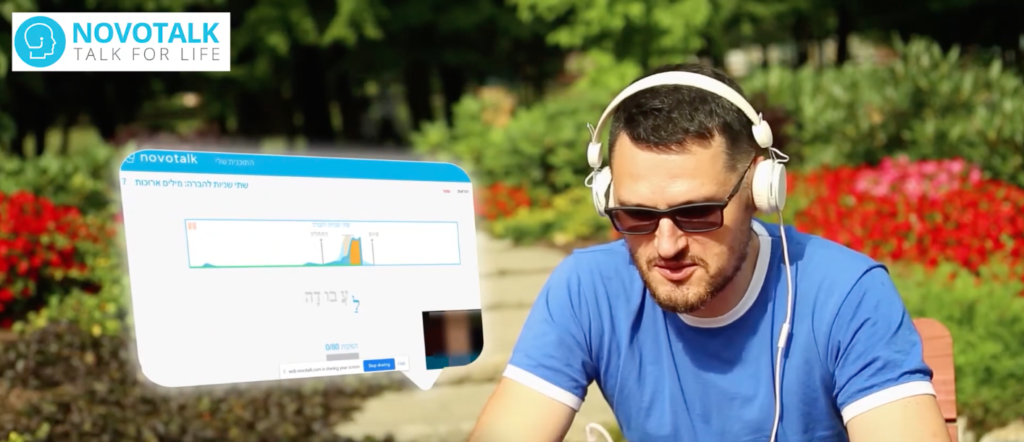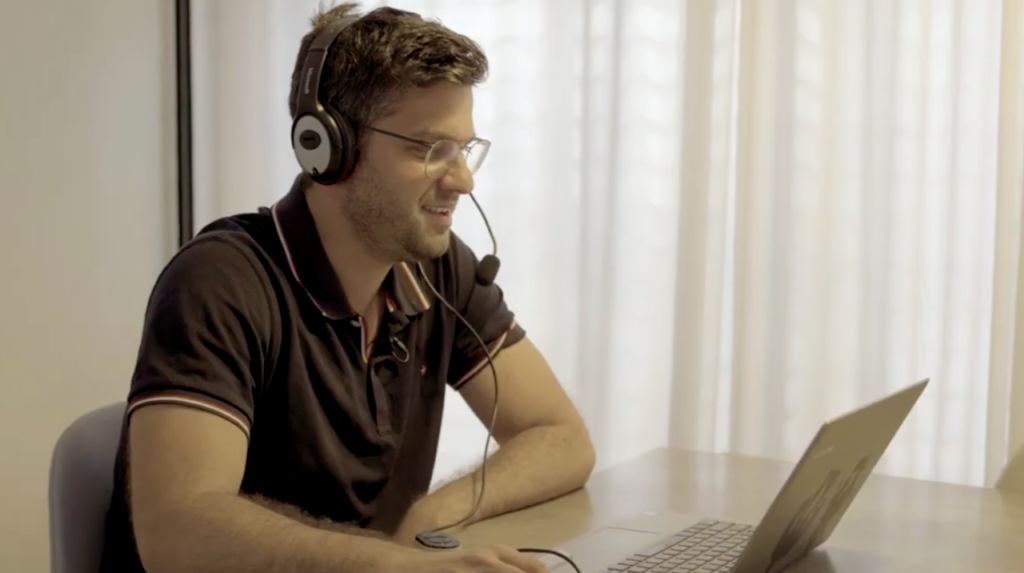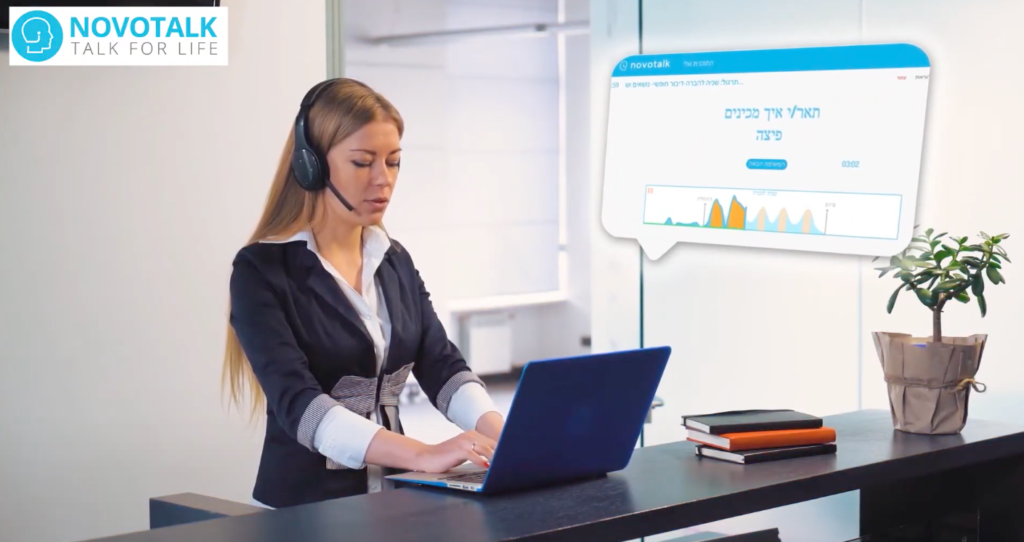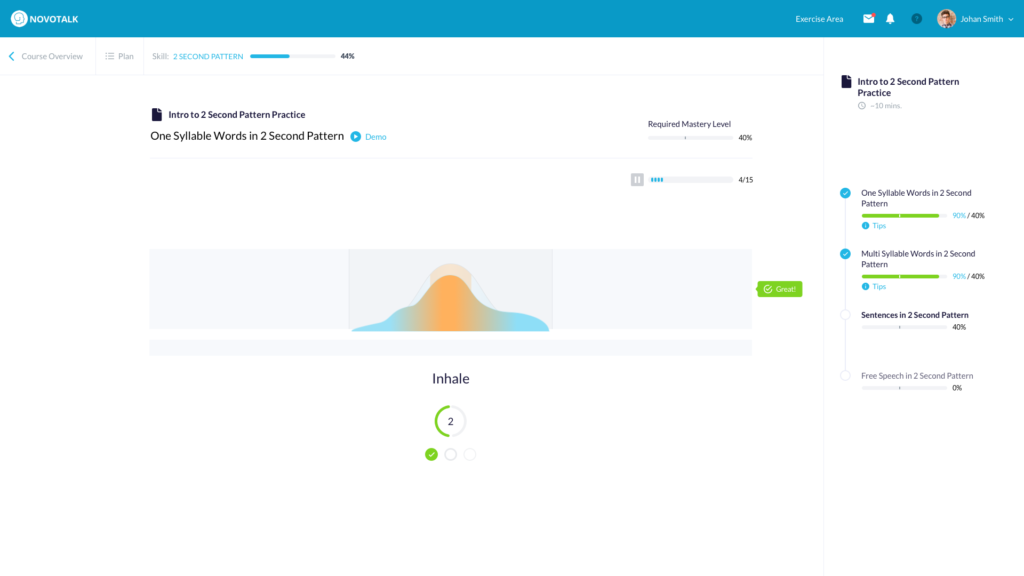Moshe, a computer programmer who suffers from a life-long stutter, tried every kind of treatment to ease the jaw spasms, severe facial twitches and feelings of suffocation he experienced whenever he spoke.
But every time he’d step out of a clinic or treatment center, he had no way of preserving the methods he had just been taught to manage his condition.
That’s when he decided to use his technological skills to develop an algorithm capable of analyzing and monitoring his speech to ensure he was practicing these various stuttering techniques correctly.

Six years later, he joined forces with speech language pathologists to create Novotalk – a startup that integrates his AI with established fluency strategies to help stutterers manage their condition anytime, anywhere. The online training can be used on a computer, tablet or even smartphone.
Around 80 million people worldwide – or one percent of the global population – suffer from a stutter.
According to the US-based National Stuttering Association, there is no unique factor that causes stuttering, but most believe it is down to a combination of environment, genetics and language development.

The 12-week speech therapy course combines clinically-validated Fluency Shaping Methods from Hadassah Medical Center in Ein Kerem, Jerusalem with sophisticated AI to create personalized exercises for its users.
“The program’s techniques use the elasticity of the brain in order to [improve a person’s stutter], while also implementing these techniques in the real world,” Zohar Be’eri, CEO of Novotalk, tells NoCamels.
“We’ve seen that many people who are successful with the clinical technique of Fluency Shaping struggle to implement the techniques when they go outside,” he says.

Fluency Shaping Methods are known to ease symptoms of stuttering, but the in-person treatments that employ them are normally intensive, expensive (costing around $5,000) and are only available at select clinics.
Speak Now
The techniques used by Novotalk include slow and deliberate speaking that has the user stretch the syllables of each word for at least two seconds; deep, diaphragmatic breathing to prevent the feeling of suffocation many stutterers experience when talking; and learning to slowly exhale before starting a sentence.
The system monitors the user during their lesson and provides them with real time feedback as they speak directly into their device to practice these methods. At the end of each session, users receive a summarized report of their performance as well as recommendations for how to improve.
Novotalk also uses the data from each practice to determine the exercises taught during the next lesson, and their difficulty level.

But unlike existing speech therapy apps, the clinicians at Hadassah Medical Center also monitor the user’s progress in the Novotalk program.
The Hadassah speech therapists can view the AI-generated data after a user has completed a lesson, and override the auto-generated feedback and provide their own input to the patient as they see fit.
They can also override other aspects of the program, such as choosing to advance the user to another lesson or reduce the number of practices per method learned.
Sign up for our free weekly newsletter
Subscribe
And if they identify any major issues, they can schedule one-on-one meetings with the user through the Novotalk platform.
But the aspect that really sets the program apart from any other, says Be’eri, is its emotional component. Towards the end of the 12 weeks, Novotalk implements Inquiry Based Stress Reduction (IBSR) into its lessons, a method that has been demonstrated to improve mental health and wellbeing in adults.
IBSR identifies and questions thoughts that cause stress and fear – in this case, scenarios that may cause a person with a stutter to feel anxiety and embarrassment – in order to discover new options and perspectives.

“It deals with perceptions of the stutter and what prohibits a person with a stutter from implementing the techniques they learn,” explains Be’eri.
“We see them as the yin and yang of our speech therapy platform,” he says. “We can’t do one without the other.”

At the end of the 12 weeks, users can choose to either renew their subscription, or instead purchase a program refresher at a nominal fee.
Novotalk’s investors include high net-worth individuals; institutions including Mount Sinai Hospital in New York, and grants from the government’s Israel Innovation Authority.
‘Democratizing Access’
Israelis can only receive access to Novotalk’s program after being diagnosed with a stutter, which they can do by scheduling an appointment with Hadassah Medical Center or with speech language pathologists from the startup itself.
According to Be’eri, hundreds of people in Israel have already successfully used the program to better manage their stutter.

“Novotalk is all about democratizing access to speech therapy, by lowering the price and by making the availability of a clinician not an issue,” says Be’eri.
In the coming weeks, Novotalk plans to expand its operations to the US, and Be’eri believes that the platform will reach other countries in the near future.
The startup, which is headquartered in Bnei Brak and conducts its R&D operations in Netanya, both in central Israel, is also developing programs that tackle other kinds of speech impediments, such as problems with vocal cords and voice disorders.

“Our e-learning platform uses speech and learning pathology to treat these conditions, but you can apply other teaching methods so long [as the AI can measure a patient’s progress using the camera and microphone],” Be’eri explains.
“So this platform has the potential of addressing many, many, many other things.”
Related posts

Editors’ & Readers’ Choice: 10 Favorite NoCamels Articles

Forward Facing: What Does The Future Hold For Israeli High-Tech?

Impact Innovation: Israeli Startups That Could Shape Our Future




Facebook comments